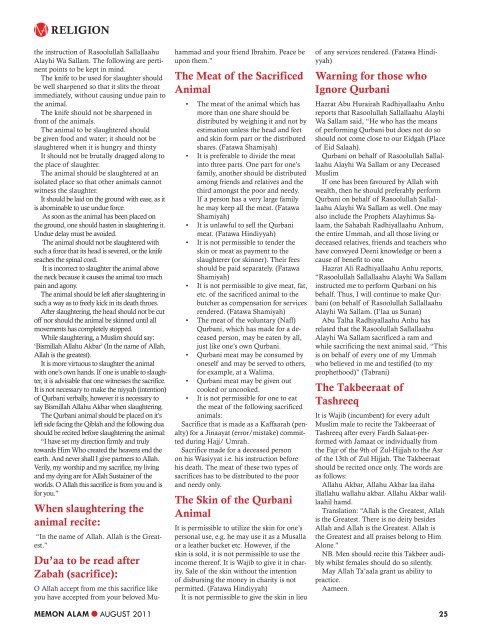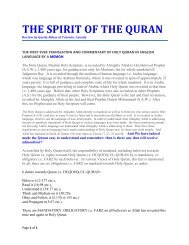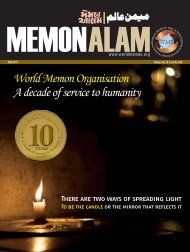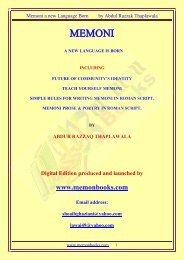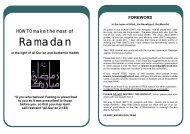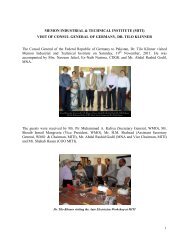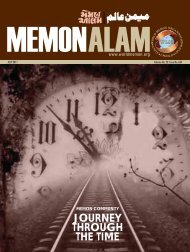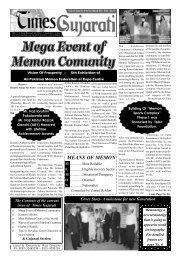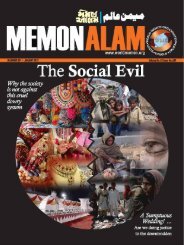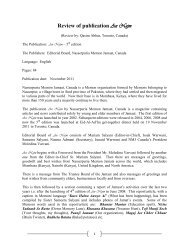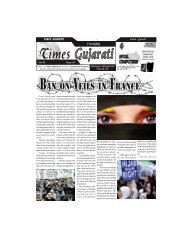August 2011 Final Pages.indd - World Memon Organization ...
August 2011 Final Pages.indd - World Memon Organization ...
August 2011 Final Pages.indd - World Memon Organization ...
Create successful ePaper yourself
Turn your PDF publications into a flip-book with our unique Google optimized e-Paper software.
RELIGION<br />
the instruction of Rasoolullah Sallallaahu<br />
Alayhi Wa Sallam. The following are pertinent<br />
points to be kept in mind.<br />
The knife to be used for slaughter should<br />
be well sharpened so that it slits the throat<br />
immediately, without causing undue pain to<br />
the animal.<br />
The knife should not be sharpened in<br />
front of the animals.<br />
The animal to be slaughtered should<br />
be given food and water; it should not be<br />
slaughtered when it is hungry and thirsty<br />
It should not be brutally dragged along to<br />
the place of slaughter.<br />
The animal should be slaughtered at an<br />
isolated place so that other animals cannot<br />
witness the slaughter.<br />
It should be laid on the ground with ease, as it<br />
is abominable to use undue force.<br />
As soon as the animal has been placed on<br />
the ground, one should hasten in slaughtering it.<br />
Undue delay must be avoided.<br />
The animal should not be slaughtered with<br />
such a force that its head is severed, or the knife<br />
reaches the spinal cord.<br />
It is incorrect to slaughter the animal above<br />
the neck because it causes the animal too much<br />
pain and agony.<br />
The animal should be left after slaughtering in<br />
such a way as to freely kick in its death throes.<br />
After slaughtering, the head should not be cut<br />
off nor should the animal be skinned until all<br />
movements has completely stopped.<br />
While slaughtering, a Muslim should say:<br />
‘Bismillah Allahu Akbar’ (In the name of Allah,<br />
Allah is the greatest).<br />
It is more virtuous to slaughter the animal<br />
with one’s own hands. If one is unable to slaughter,<br />
it is advisable that one witnesses the sacrifice.<br />
It is not necessary to make the niyyah (intention)<br />
of Qurbani verbally, however it is necessary to<br />
say Bismillah Allahu Akbar when slaughtering.<br />
The Qurbani animal should be placed on it’s<br />
left side facing the Qiblah and the following dua<br />
should be recited before slaughtering the animal:<br />
“I have set my direction firmly and truly<br />
towards Him Who created the heavens end the<br />
earth. And never shall I give partners to Allah.<br />
Verily, my worship and my sacrifice, my living<br />
and my dying are for Allah Sustainer of the<br />
worlds. O Allah this sacrifice is from you and is<br />
for you.”<br />
When slaughtering the<br />
animal recite:<br />
“In the name of Allah. Allah is the Greatest.”<br />
Du’aa to be read after<br />
Zabah (sacrifice):<br />
O Allah accept from me this sacrifice like<br />
you have accepted from your beloved Muhammad<br />
and your friend Ibrahim. Peace be<br />
upon them.”<br />
The Meat of the Sacrificed<br />
Animal<br />
• The meat of the animal which has<br />
more than one share should be<br />
distributed by weighing it and not by<br />
estimation unless the head and feet<br />
and skin form part or the distributed<br />
shares. (Fatawa Shamiyah)<br />
• It is preferable to divide the meat<br />
into three parts. One part for one’s<br />
family, another should be distributed<br />
among friends and relatives and the<br />
third amongst the poor and needy.<br />
If a person has a very large family<br />
he may keep all the meat. (Fatawa<br />
Shamiyah)<br />
• It is unlawful to sell the Qurbani<br />
meat. (Fatawa Hindiyyah)<br />
• It is not permissible to tender the<br />
skin or meat as payment to the<br />
slaughterer (or skinner). Their fees<br />
should be paid separately. (Fatawa<br />
Shamiyah)<br />
• It is not permissible to give meat, fat,<br />
etc. of the sacrificed animal to the<br />
butcher as compensation for services<br />
rendered. (Fatawa Shamiyah)<br />
• The meat of the voluntary (Nafl)<br />
Qurbani, which has made for a deceased<br />
person, may be eaten by all,<br />
just like one’s own Qurbani.<br />
• Qurbani meat may be consumed by<br />
oneself and may be served to others,<br />
for example, at a Walima.<br />
• Qurbani meat may be given out<br />
cooked or uncooked.<br />
• It is not permissible for one to eat<br />
the meat of the following sacrificed<br />
animals:<br />
Sacrifice that is made as a Kaffaarah (penalty)<br />
for a Jinaayat (error/mistake) committed<br />
during Hajj/ Umrah.<br />
Sacrifice made for a deceased person<br />
on his Wasiyyat i.e. his instruction before<br />
his death. The meat of these two types of<br />
sacrifices has to be distributed to the poor<br />
and needy only.<br />
The Skin of the Qurbani<br />
Animal<br />
It is permissible to utilize the skin for one’s<br />
personal use, e.g. he may use it as a Musalla<br />
or a leather bucket etc. However, if the<br />
skin is sold, it is not permissible to use the<br />
income thereof. It is Wajib to give it in charity.<br />
Sale of the skin without the intention<br />
of disbursing the money in charity is not<br />
permitted. (Fatawa Hindiyyah)<br />
It is not permissible to give the skin in lieu<br />
of any services rendered. (Fatawa Hindiyyah)<br />
Warning for those who<br />
Ignore Qurbani<br />
Hazrat Abu Hurairah Radhiyallaahu Anhu<br />
reports that Rasoolullah Sallallaahu Alayhi<br />
Wa Sallam said, “He who has the means<br />
of performing Qurbani but does not do so<br />
should not come close to our Eidgah (Place<br />
of Eid Salaah).<br />
Qurbani on behalf of Rasoolullah Sallallaahu<br />
Alayhi Wa Sallam or any Deceased<br />
Muslim<br />
If one has been favoured by Allah with<br />
wealth, then he should preferably perform<br />
Qurbani on behalf of Rasoolullah Sallallaahu<br />
Alayhi Wa Sallam as well. One may<br />
also include the Prophets Alayhimus Salaam,<br />
the Sahabah Radhiyallaahu Anhum,<br />
the entire Ummah, and all those living or<br />
deceased relatives, friends and teachers who<br />
have conveyed Deeni knowledge or been a<br />
cause of benefit to one.<br />
Hazrat Ali Radhiyallaahu Anhu reports,<br />
“Rasoolullah Sallallaahu Alayhi Wa Sallam<br />
instructed me to perform Qurbani on his<br />
behalf. Thus, I will continue to make Qurbani<br />
(on behalf of Rasoolullah Sallallaahu<br />
Alayhi Wa Sallam. (I’laa us Sunan)<br />
Abu Talha Radhiyallaahu Anhu has<br />
related that the Rasoolullah Sallallaahu<br />
Alayhi Wa Sallam sacrificed a ram and<br />
while sacrificing the next animal said, “This<br />
is on behalf of every one of my Ummah<br />
who believed in me and testified (to my<br />
prophethood)” (Tabrani)<br />
The Takbeeraat of<br />
Tashreeq<br />
It is Wajib (incumbent) for every adult<br />
Muslim male to recite the Takbeeraat of<br />
Tashreeq after every Fardh Salaat-performed<br />
with Jamaat or individually from<br />
the Fajr of the 9th of Zul-Hijjah to the Asr<br />
of the 13th of Zul Hijjah. The Takbeeraat<br />
should be recited once only. The words are<br />
as follows:<br />
Allahu Akbar, Allahu Akbar laa ilaha<br />
illallahu wallahu akbar. Allahu Akbar walillaahil<br />
hamd.<br />
Translation: “Allah is the Greatest, Allah<br />
is the Greatest. There is no deity besides<br />
Allah and Allah is the Greatest. Allah is<br />
the Greatest and all praises belong to Him<br />
Alone.”<br />
NB. Men should recite this Takbeer audibly<br />
whilst females should do so silently.<br />
May Allah Ta’aala grant us ability to<br />
practice.<br />
Aameen.<br />
MEMON ALAM AUGUST <strong>2011</strong> 25


